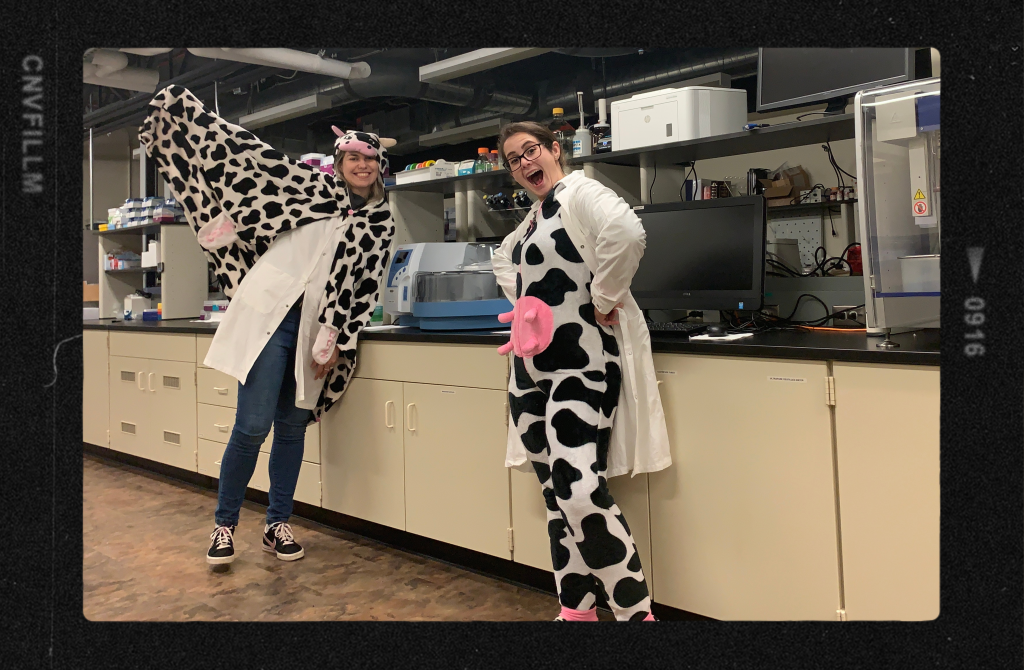March is Women’s History Month, so it is fitting that this month’s highlight for Science is Everyone: Voices in STEM is Dr. Erika Ganda, Assistant Professor of Food Animal Microbiomes at Penn State University.
Dr. Ganda is originally from Brazil and immigrated to the United States as a graduate student to earn her PhD in Animal Science at Cornell University. She now oversees the Ganda Lab at Penn State, which is funded by the U.S. Department of Agriculture. Apart from the incredible work done in the lab to improve food safety and animal health and productivity, the Ganda Lab is unique for its all-women team of researchers.
As a woman in STEM, an immigrant, and the primary investigator of her own lab, Dr. Ganda understands the demands of a career in research. Below, she reflects on three things she would tell her younger self before setting out in science.
Being a woman in STEM is hard. Find your people and keep going.
“Your future depends on many things, but mostly on you.” – Frank Tyger
Many of us chose to pursue a career in research because we have innate curiosities about the world and the desire to find answers to those questions. While the share of women in science is growing, there is still a long way to go. A lot of research is failure, rejection, and finding the wrong answers before discovering the right one. When you’re also feeling isolated and alone, it is easy to second guess your abilities and question if this is the right career for you. To combat that, it is critical to seek kind, trustworthy mentors who see your potential and can guide you when you start to feel lost or discouraged. Find your people. Seek and create your own opportunities. And remember – your peers are as much your mentors as the professors you work with.
Now that I have my own lab full of young women at the start of their research careers, I recognize how many of us have struggled with imposter syndrome despite our objective qualifications. Overcoming those doubts starts at the top. I am proud to be a mentor to other women and share the struggles I have had, and pass on the lessons I learned from my own mentors: you don’t have to suffer alone, a successful experiment is extremely dependent on your prior organization, and the wrong answer only matters if it stops you from pursuing your curiosities, so keep going.
The fight for federal funding is a combination of luck and reading the instructions.
Federal dollars for research are limited, so be prepared to go above and beyond to win them. It goes without saying that the scientific foundation of your research proposal must be airtight, but you should also be able to articulate the design, methodology, and reasoning behind the work to help your reviewer understand why your proposal deserves that funding. Effective communication is key.
While the final decision to award the grant or not is ultimately out of your hands, you can significantly increase your odds of success by simply reading the instructions. Although the process of putting a research proposal together can be arduous, don’t miss the forest from the trees. What information was requested in the proposal? Check that you have it. Plan ahead– having interim deadlines helps a lot. Have a question about the application? No one will be offended if you ask it – and even better to ask it early. Reach out to your peers! Getting the details straightened out at the front end can save many headaches down the line and allows for the research itself to shine.
The people around you matter just as much as the science.
I know from personal experience that the people with whom you conduct research can make or break your overall experience. And they can make a lasting impact in your career. Scientists usually do not like the word “network” but in reality, it is absolutely essential to be intentional and strategic about your network. I am really thankful for the people I have met over the years and have the privilege to continue to work with!
As the leader of my lab and someone others look up to, I want to foster an environment in which mistakes are expected and scrutinized, but never held against you. In fact, mistakes can point you in the right direction. Be honest about those things you can’t seem to get right no matter how hard you try, because that’s often how people with complementary strengths get connected. At the end of the day, my job is to ensure each woman of the Ganda Lab becomes a researcher in her own right. The best way to achieve that is with the permission to mess up, try again, and apply the learning.
Wear sunscreen.
Alright, maybe this isn’t a serious piece of advice, but when I need a pick-me-up, I play this. It never fails to lighten the mood.







